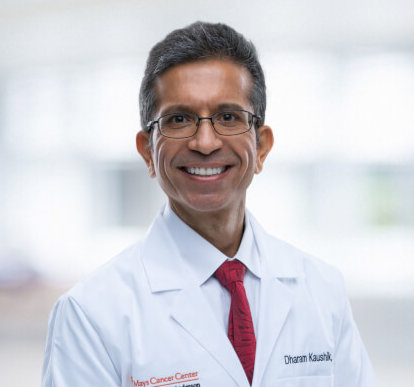Yoga improved physical and mental well-being and promoted a robust immune response in a randomized clinical trial of men with prostate cancer.
Contact: Will Sansom, (210) 567-2579, sansom@uthscsa.edu
SAN ANTONIO (Nov. 23, 2021) — An estimated 1.4 million men were diagnosed with prostate cancer worldwide in 2020, according to the American Cancer Society and the International Agency for Research on Cancer. With a new diagnosis of prostate cancer, these men have approximately a 30% incidence of depression and anxiety, a fourfold higher risk of heart attack and a twofold higher risk of committing suicide.
Yoga, a set of specific body postures combined with breathing techniques and mindfulness, may be an easy-to-implement answer in this stressful situation.
A pilot randomized clinical trial by urology researchers at the Mays Cancer Center, home to UT Health San Antonio MD Anderson Cancer Center, enrolled 29 men who were awaiting prostatectomy. Fourteen were randomized to participate in yoga and 15 were assigned to the standard of care, which was just waiting for surgery.

“We gave the active intervention group six weeks of yoga, at least twice a week, for 60 to 75 minutes,” said lead author Dharam Kaushik, MD, associate professor of urology in UT Health San Antonio’s Joe R. and Teresa Lozano School of Medicine and cancer surgeon with the Mays Cancer Center.
Via questionnaires, the team documented the men’s perceived quality of life at the start of yoga, at the time of surgery and after surgery. Men who did not do yoga completed the same questionnaires at study enrollment and at the other two junctures.
The team drew blood samples before the men began yoga and after all sessions were completed. Samples were also taken from men who did not do yoga.
Sense of well-being
“What we found was very interesting,” Dr. Kaushik said. “Yoga improved quality of life in men compared to the standard of care, specifically on the fatigue scale, meaning they were less tired; on sexual function; and on their functional, physical and social well-being.”
A more robust immune response and lower levels of inflammation were observed in the yoga group, he added.
“This is positive data and further large-scale studies are needed, for which this pilot study can be a model,” Dr. Kaushik said.
Biomarkers and yoga
The primary study outcome was self-reported quality of life assessed by the questionnaires. Changes in immune cell status and inflammatory markers with yoga were secondary outcomes.
The yoga group showed increased numbers of circulating CD4+ and CD8+ T cells, which are important contributors to immune health. Among other markers, the yoga group also exhibited a reduction in inflammatory markers called cytokines.
The median age of participants was 56 years in the yoga group and 60 years in the standard of care group.
Yoga has been studied in breast cancer, but not at the level of detail of this study, matching self-reported quality of life data with markers of immune response and inflammation, Dr. Kaushik said.
“If we are able to encourage patients to do a small, inexpensive and easy-to-implement intervention that can have a big impact, then why not?” he said.
Effects Of Yoga In Men With Prostate Cancer On Quality Of Life And Immune Response: A Pilot Randomized Controlled Trial
Dharam Kaushik MD, Pankil K. Shah MD, Neelam Mukherjee PhD, Niannian Ji PhD, Furkan Dursun MD, Addanki P. Kumar PhD, Ian M. Thompson Jr MD, Ahmed M. Mansour MD, Richapriya Jha MS, Xiaoyu Yang PhD, Hanzhang Wang MD, Nydia Darby DPT, J. Ricardo Rivero MD, Robert S. Svatek MD, Michael A. Liss MD
First published: Prostate Cancer and Prostatic Diseases, Nov. 23, 2021
https://www.nature.com/articles/s41391-021-00470-w
The Mays Cancer Center, home to UT Health San Antonio MD Anderson, is one of only four National Cancer Institute-designated Cancer Centers in Texas. The Mays Cancer Center provides leading-edge cancer care, propels innovative cancer research and educates the next generation of leaders to end cancer in South Texas. Visit www.UTHealthsaMDAnderson.org.
The University of Texas Health Science Center at San Antonio, also referred to as UT Health San Antonio, is one of the country’s leading health sciences universities and is designated as a Hispanic-Serving Institution by the U.S. Department of Education. With missions of teaching, research, patient care and community engagement, its schools of medicine, nursing, dentistry, health professions and graduate biomedical sciences have graduated 39,700 alumni who are leading change, advancing their fields, and renewing hope for patients and their families throughout South Texas and the world. To learn about the many ways “We make lives better®,” visit www.uthscsa.edu.
Stay connected with The University of Texas Health Science Center at San Antonio on Facebook, Twitter, LinkedIn, Instagram and YouTube.



